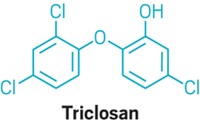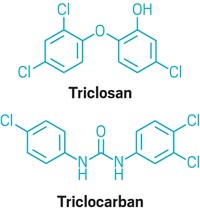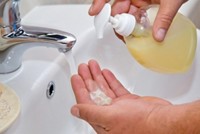Advertisement
Grab your lab coat. Let's get started
Welcome!
Welcome!
Create an account below to get 6 C&EN articles per month, receive newsletters and more - all free.
It seems this is your first time logging in online. Please enter the following information to continue.
As an ACS member you automatically get access to this site. All we need is few more details to create your reading experience.
Not you? Sign in with a different account.
Not you? Sign in with a different account.
ERROR 1
ERROR 1
ERROR 2
ERROR 2
ERROR 2
ERROR 2
ERROR 2
Password and Confirm password must match.
If you have an ACS member number, please enter it here so we can link this account to your membership. (optional)
ERROR 2
ACS values your privacy. By submitting your information, you are gaining access to C&EN and subscribing to our weekly newsletter. We use the information you provide to make your reading experience better, and we will never sell your data to third party members.
Business
Targeting Antibacterial Soaps
Regulation: Proposed FDA rule would require manufacturers to show product safety and effectiveness
by Britt E. Erickson
December 16, 2013
Manufacturers of antibacterial soaps and body washes will have to show that their products are safe for everyday use and that they are more effective than ordinary soap at preventing the spread of germs. That’s according to a rule proposed today by the Food & Drug Administration. If the rule is finalized, companies that fail to show such safety and effectiveness will have to either reformulate or relabel their products.
FDA’s action comes amid growing concerns about possible health effects associated with antibacterial ingredients and their potential to lead to antibiotic resistance. Animal data suggest that daily exposure to some active ingredients used in antibacterial soaps, for example triclosan and triclocarban, could result in hormonal effects, says Sandra L. Kweder, deputy director of FDA’s Office of New Drugs. “Laboratory studies also suggest that antibacterial ingredients may contribute to changes in antibiotic susceptibility,” she notes.
“Millions of Americans use antibacterial hand soaps and body washes,” Kweder says. “They are used every day at home, work, schools, and other public settings where the risk of bacterial infections is relatively low.” Kweder estimates that there are about 2,000 antibacterial soaps and body wash products on the market today in the U.S. The use of such products is becoming increasingly prevalent, she says.
Because consumers are exposed to high levels of these antibacterial ingredients, “there should be clearly demonstrated benefit from using antibacterial soaps to balance out any potential risk,” Kweder notes. “FDA does not have data to demonstrate that these products are any more effective at preventing people from getting sick than washing with plain soap and water,” she says.
FDA’s proposed rule is part of a settlement reached last month with the environmental group Natural Resources Defense Council. The group sued FDA in 2010 for not finalizing a 1978 rule that would have banned triclosan from certain consumer products. Under the settlement, FDA committed to issuing today’s proposed rule and taking final action by 2016.
“This is a good first step toward getting unsafe triclosan off the market,” says Mae Wu, an attorney with NRDC’s health program. “Washing your hands with soap containing triclosan doesn’t make them cleaner than using regular soap and water and can carry potential health risks.”
The proposed rule does not apply to toothpaste, hand sanitizers, wipes, or antibacterial products used in health care settings or food preparation facilities. FDA is accepting comments on the rule until June 2014.





Join the conversation
Contact the reporter
Submit a Letter to the Editor for publication
Engage with us on Twitter